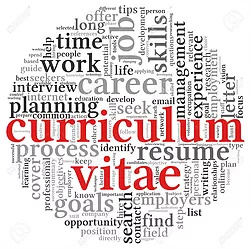What Is A Curriculum Vitae And When Do I Need One?
- Mar 28, 2018
- 3 min read
Updated: Sep 29, 2021
While both Curriculum Vitas (CVs) and resumes serve the same purpose—acting as marketing documents that highlights your skills, job experiences and education qualifications—there exist some fundamental differences that you should know as a career seeker. Understanding the differences between these two marketing documents will help you nail the job interviews.
Specifically, a more subtle—which is important—distinction between a resume and curriculum vitae is that a resume seeks to detail each role and responsbility of every job you’ve had. The primary purpose of a curriculum vitae will be to help you craft a scholarly identity. Therefore, a curriculum vitae is more scientific oriented—they provide complete details concerning ones’ academic and research experiences—as opposed to resumes that explain your roles and responsibilites in detail. Most people ask, "what's the difference between a resume and curriculum vitae?".
On the other hand, a curriculum vitae is a living document providing the employer with details on, but not limited to: degree’s, awards, achievements, honors, memberships, certifications, license, community involvement, published journals, published articles, etc. How do you craft a masterful curriculum vitae that provides complete details concerning your academic and research experiences?
Well, the fact that a CV should be more detailed doesn’t mean that you should have a 10 page document. There’s always a caveat: you should strike the right balance between a quality document that has a comprehensive set of your qualifications and the ability of this document to attract your potential employer.
So, are you ready to begin crafting your CV?
What information should you include in your CV?
Well, a perfectly crafted CV should contain the following details:
#1: Contact Information
This is the essential information that your hiring manager will use to track you. Therefore, your CV should contain your full names, your contact addresses (both home and work), your phone number(s) and your email address.
#2: Academic Background
Indicate all your academic degrees/diplomas/certifications that you’ve acquired in the following order:
Your post graduate qualifications. List whether the degree was a major or a minor, thesis or dissertation title, and honors.
Graduate qualifications. List whether the degree was a major or a minor, thesis or dissertation title and honors.
Undergraduate qualifications. Indicate whether the degree was a major or a minor.
Professional certifications or licenses
#3: Academic Experience
State all positions that you held, the names of the institutions that you are currently working for and those that you previously worked for. Ideally, your academic experience should contain the following details:
The courses taught and the ones introduced.
The innovations that you introduced in teaching
Teaching evaluations
#4: Technical and other specialized skills
You should indicate all your technical and other specialized skills that you’ve acquired besides your academic qualifications. For instance, if you learned a particular programming language, then you should indicate it under the technical and specialized skills.
#5: Related or other job experiences
Your CV should highlight other job skills that you’ve acquired besides your work experiences.
#6: Professional and academic honors/awards
Highlight all the honors and other awards that have been conferred upon you in the course of your service.
#7: Professional Development
You should list all the conferences and workshops that you’ve attended and the titles of papers that you presented in these conferences/workshops.
#8: Research and scholarly activities
You should list the following:
The journal articles that have been published in peer reviewed publications.
Titles of papers that you presented in conference/workshop proceedings.
Books that you’ve published.
Book chapters that you’ve published.
Your articles that have been published in magazines.
Your articles that haven’t been published but are currently under submission.
Work in progress.
#9: Grants
List all the grants that you’ve received so far.
#10: Service
List all the services that you’ve rendered whether they are academic, professional or community services.
#11: Academic and research interests
Highlight the topical areas that are your research interests.
#12: Affiliations and memberships
Indicate all the professional bodies in which you’re a member.
#13: References
Indicate a list of persons that can recommend you and their contact information.
If after reading this post you still are not sure if you need a curriculum vitae or a resume, contact a master curriculum vitae writing searvice in Arizona, www.domyresume.net. Do My Resume.NET reviews curriculum vitae and resumes for free, 100% free.






Comments